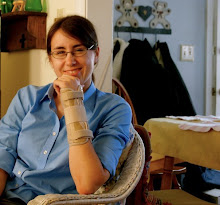"But in truth justice was, as it seems, something of this sort; however, not with respect to a man's minding his external business, but with respect to what is within, with respect to what truly concerns him and his own. He doesn't let each part in him mind other people's business or the three classes in the soul meddle with each other, but really sets his own house in good order and rules himself; he arranges himself, becomes his own friend, and harmonizes the three parts, exactly like three notes in a harmonic scale, lowest, highest, and middle. And if there are some other parts in between, he binds them together and becomes entirely one from many, moderate and harmonized. Then, and only then, he acts, if he does act in some way-- either concerning the acquisition of money, or the care of the body, or something political, or concerning private contracts. In all these actions he believes and names a just and fine action one that preserves and helps to preserve this condition, and wisdom the knowledge that supervises this action; while he believes and names an unjust action one that undoes this condition, and lack of learning, in its turn, the opinion that supervises this action."
From The Republic of Plato, Book IV
Tuesday, February 03, 2009
Subscribe to:
Post Comments (Atom)

No comments:
Post a Comment